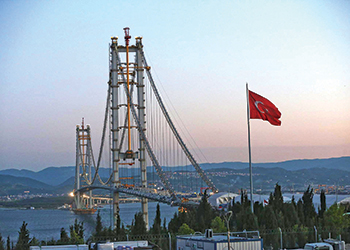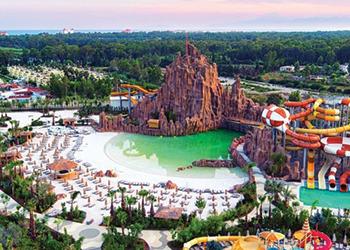
 Izmit Bay Bridge ... opened this year.
Izmit Bay Bridge ... opened this year.
Turkey is pressing ahead with housing and infrastructure projects, in the face of political upheaval at home and economic gloom abroad.
Construction remains one of the brighter sectors of the Turkish economy which has been riddled with domestic political tension that climaxed last month in a failed coup attempt. The country is now getting reacquainted with the state of emergency – something Turkey had experienced last in the 1990s.
The latest turn of events will see a further dwindling in foreign capital inflow, which has been negatively impacting the domestic economy in recent years.
Given the drop in business in the home market, Turkish contractors have been increasingly looking for business in the global market. However, the drastic drop in oil prices has meant a further erosion in prospects in their established markets.
“The oil plunge will negatively affect the feasibility of some major construction projects abroad and trigger global competitiveness further. These dynamics have directed Turkish contractors to seek new markets,” The Turkish Contractors’ Association (TMB) said in its first-quarter projection report.
The largest markets for Turkish contractors last year were Russia, with a share of around 26 per cent; Kuwait at 22.4 per cent; Turkmenistan at 16.3 per cent; Algeria at 10.8 per cent and Saudi Arabia at 5.3 per cent, according to TMB data.
Turkish construction companies suffered a severe drop in the amount of work they undertook overseas in the first quarter of this year compared to the same period of 2015, according to a senior official of the Construction Materials Industrialists Association (Imsad).
According to Oktay Alptekin, deputy head of Imsad, Turkish firms secured just eight projects worth $1 billion in the first three months of this year compared to a total of 28 projects worth $2.78 billion in the first three months of 2015.
He noted that there has been a visible slowdown in the volume of infrastructure and construction projects in neighbouring regions due to the rise in political problems and the oil slump.
“Our sector’s exports continue to decline amid these problems. Turkey’s construction material exports dropped to $3.76 billion in the first quarter, a 15.6 per cent loss from the same period of 2015. Our exports already declined to $17 billion in 2015 from around $21 billion in 2014. We expect a lower figure this year,” added Alptekin.
Within Turkey, the focus has been on infrastructure projects, including port, high-speed train, subway and highway developments, as well as integrated health campus projects and urban transformation projects.
The ongoing urban redevelopment projects have kept the construction sector relatively buoyant. According to Hurriyet, nearly 90,000 buildings, including residential buildings and offices, have been deemed risky and will need to be renovated or rebuilt, opening up business opportunities for the sector once the initial shock waves of the failed coup attempt subside.
Alptekin said the domestic market’s growth rates had fuelled hope in the sector as the construction sector grew 6.6 per cent in the first quarter of the year, higher than the country average at 4.8 per cent.
 |
The Land of Legends, Turkey’s largest edutainment centre ... opened this year. |
“While Turkey’s GDP grew 4.8 per cent in the first quarter of the year, the construction sector saw a 6.6 per cent of growth. Some of the delayed projects have been accelerated over this year. We saw a 32 per cent increase in the number of construction permits. This gives us hope for the future,” Alptekin added.
According to Imsad data, the construction materials sector’s domestic market volume was $44.5 billion at the end of 2015 with an additional $17 billion earned from foreign markets, totalling $61.5 billion.
Meanwhile, BMI Research had earlier this year indicated a long-term bullish view on Turkish infrastructure, thanks to the privatisation of assets and the use of public-private partnerships (PPPs), a supportive government and a geographic and demographic potential.
“However, over 2016 and 2017, we expect investment to slow – particularly in the residential and non-residential sectors – as currency depreciation, tightening credit and political risk remain key drags on sentiment,” said a BMI report.
According to the report, rail and road projects continue to propel growth of the transport infrastructure, while energy and utilities infrastructure growth will slow down this year on the back of the breakdown in relations between Moscow and Ankara and its impact on Turkey’s nuclear and pipeline projects.
It indicated that the residential sector will perform well thanks to the contracts awarded under the government’s $500-billion regeneration programme and continued strong building in Istanbul.
Turkey has numerous big-ticket infrastructure projects under way or on the anvil. Among them is a new international airport – Istanbul’s third – which would be one of the world’s biggest, with six runways and serving 350 destinations for as many as 200 million passengers per year. Work on the project is reported to be more than 25 per cent complete.
Other mega projects include:
• Canal Istanbul Project, which aims to build a proposed canal across the city’s European side to supplement the Bosphorus. The new canal is expected to exceed 40 km in length, 500 m wide at the surface and 400 m at the base and 30 m deep.
• A $2.36-billion motorway project that will connect to a new bridge spanning Istanbul’s Bosphorus Strait. The 115-km motorway is expected to be completed in three years.
• A 600-km motorway project that will directly link the Black Sea and Mediterranean coasts of Turkey with a route that will negotiate mountains via 28 tunnels. An 88-km section of the road, which starts in the Black Sea province of Ordu, is expected to be finished this year, with the entire road targeted for completion next year.
The country also recently celebrated the opening of the Izmit Bay Bridge, or ‘Osman Gazi, and the Land of Legends, Turkey’s largest edutainment centre. The Izmit Bay Bridge constitutes an essential part of an ongoing 433-km motorway, which is expected to provide a direct connection from Istanbul to the third and fourth largest cities Izmir and Bursa respectively. The estimated $9-billion motorway, which will reduce the travel time between Istanbul and Izmir province to three-and-a-half hours from nine hours, is scheduled to be completed in 2018.
The $1-billion Land of Legends project, which is located in Antalya, is a collaboration between Rixos World Parks & Entertainment, Dubai-based Emaar Real Estate and global cultural creativity brand Dragone Productions.





















_0001.jpg)


.jpg)
















.jpg)








.jpg)



.jpg)